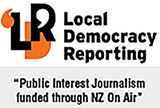Agriculture gap opened at council

There is a glaring gap in expertise at the Ashburton District Council around the region’s largest economic contributor, agriculture.
The council’s specialist agriculture portfolio advisor role finished at the end of May.
That meant Richard Fitzgerald, who held the role since September 2020, moved on, taking his farming sector expertise with him.
That poses a challenge for the economic development team in the agricultural space, chief executive Hamish Riach said.
“We won’t have an agricultural expert on our team, we won’t have the resource capacity or ability to be as involved in this area as we have been over the last three years.”
With Fitzgerald gone, the work falls back on the council.
“The Economic Development function of council will continue to support the wider business community, including farming and agricultural businesses,” council compliance and development group manager Jane Donaldson said.
The role was fixed-term and as its external funding came to an end, so too did the role.
“The role was to help navigate challenging times for farmers, who were facing new rules for freshwater and environmental management.”
The role started in August, 2020, and was initially for 18 months, fully funded through the Government’s Provincial Growth Fund.
It was then extended through to May 31, 2023, with additional funding “from mostly Our Land and Water plus additional funds from council”, Donaldson said.
“Highlight achievements of the role include producing two major reports on the economic impact of those freshwater rules, reports that have been used by other organisations and councils including the Canterbury Mayoral Forum.”
Fitzgerald also worked on a project called Supporting Land Use Adaption for a Climate Changed Future.
“The project was aimed at supporting businesses to explore future possibilities for land use, and food and fibre production,” Donaldson said.
The proposed five-year, $8.6 million project required funding from the Ministry for Primary Industries to continue and an application was put forward, but it decided not to fund the project, Donaldson said.
Collaborating with the agriculture sector, it had taken 18 months of development to get to the funding application stage.
Alternative funding structures and different approaches were considered by the resilient business working group, which had helped steer the project, but with council funding ending at the end of June, it was deemed difficult to confirm commitment and funding for a new approach within the timeframe.
“The Economic Development function of council hopes to be able to share insights from the development of the Resilient Business project with other similar projects,” Donaldson said.
- By Jonathan Leask

